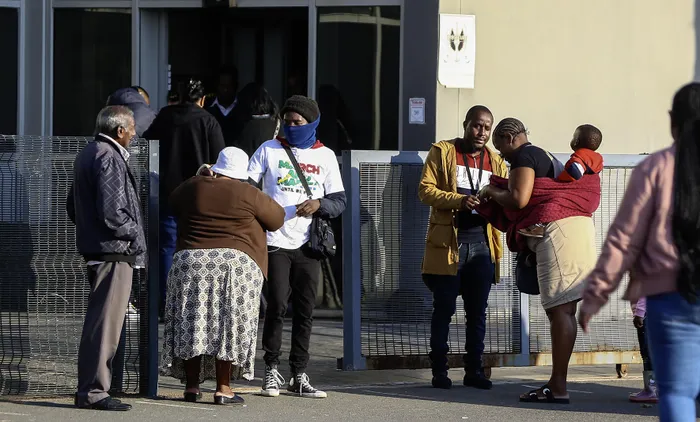Foreign nationals’ right to healthcare must be protected, says SAHRC

Operation Dudula launched a national campaign in June aimed at stopping undocumented migrants from accessing public healthcare services, a move the SAHRC has denounced.
Image: Leon Lestrade / Independent Newspapers.
The SA Human Rights Commission (SAHRC) has urged National Police Commissioner General Fannie Masemola to take male sure that Operation Dudula and other anti-migrant groups do not prevent foreign nationals from accessing healthcare.
Speaking during a media briefing in Johannesburg on Tuesday, SAHRC commissioner Professor Tshepo Madlingozi said it was unlawful for anyone to block undocumented foreign persons from accessing health-care facilities.
The Commission released several reports highlighting the current state of human rights in South Africa.
“We disagree that foreigners, non-nationals, should be scapegoated for the problems in the healthcare system,” said Madlingozi.
“We were very clear that it's unlawful for any citizen or anyone to try to enforce immigration laws,” he added.
“No one is allowed to play the role that is supposedly played by Home Affairs.”
This follows recent actions by Operation Dudula and other movements, including the March and March Movement, which have been actively blocking undocumented foreign nationals from receiving treatment at public healthcare facilities.
The Commission has labelled these actions illegal.
Operation Dudula launched a national campaign in June aimed at stopping undocumented migrants from accessing public healthcare services.
The group claims that the healthcare system is overburdened and should prioritise South African citizens.
The movement’s activities, particularly in Gauteng, have drawn criticism from government officials and human rights organisations. However, some community members have expressed support for the campaign.
A similar group, the March and March Movement, has also been involved in preventing undocumented migrants from accessing health facilities in parts of Gauteng and KwaZulu-Natal.
Madlingozi confirmed that the Commission met with General Masemola to discuss enforcement of the law against individuals and groups blocking access to healthcare.
“We’ve engaged with the National Police Commissioner, we've engaged with the National Health Department to say that they must do their work, which is policing, which is ensuring that everyone is able to access healthcare,” he said.
He reiterated that it is not the role of any private individual or organisation to enforce immigration laws.
“The answer is very, very clear - it is unlawful to prevent anyone, either documented or undocumented, from accessing healthcare,” Madlingozi said.
He also revealed that the SAHRC would soon announce additional measures to address the issue.
“I can also disclose that in the next couple of days, we’ll be announcing further measures to cap these practices. International law is very clear - no child should be rendered stateless,” he said.
Madlingozi emphasised that children of foreign nationals must also be allowed access to healthcare services.
“It doesn't matter who they are, but international law is very clear that no child should be rendered stateless. The Constitution is also very clear when it comes to the rights of the child that every child, whether documented or undocumented, has the right to access education and healthcare.”
IOL News previously reported that Masemola has said that there was no dedicated police unit to deal with anti-migrant groups around the country that are blocking undocumented foreigners from accessing healthcare services.
On Operation Dudula, we don’t have a unit specifically to deal with them. We have Public Order Policing (POP) countrywide, and their job is to deal with crowd management,” Masemola said.
According to SAPS, the POP Unit is responsible for maintaining public order, managing public gatherings, major events and protests.
“So wherever there are problems, they do go out and assist,” Masemola explained.
“They cannot wait at a clinic just in case something happens - they have a lot of other work to do. But as and when we have an indication that there may be a problem, we will respond to those health institutions accordingly.”
simon.majadibodu@iol.co.za
IOL News